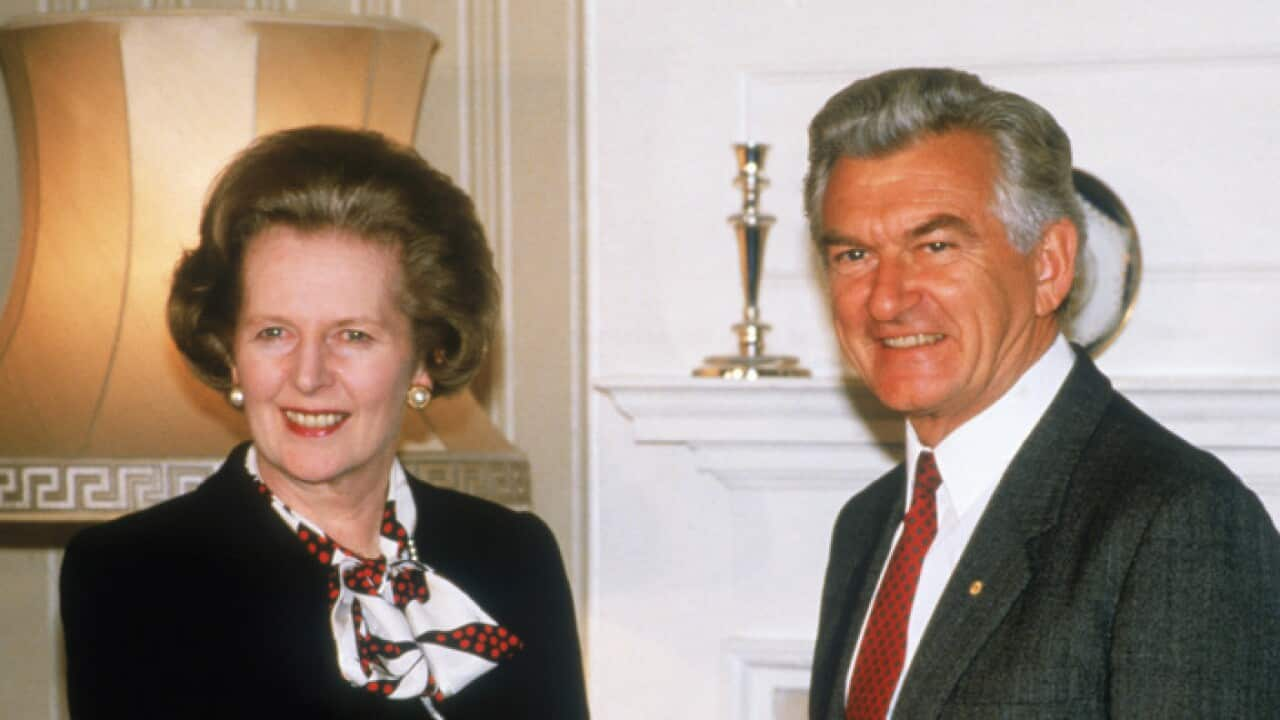(Transcript from World News Radio)
They had some famous rows during the 1980s and now there are fresh details about the turbulent relationship between political heavyweights Bob Hawke and Margaret Thatcher.
The former Labor leader, who has been described in official British government documents as an arrogant 'ocker', spent five years fighting to secure an original copy of Australia's Constitution.
Brett Mason reports from London.
Two Prime Ministers famous for their steely resolve.
Former Australian Prime Minister Bob Hawke says negotiations with his British counterpart Margaret Thatcher were always colourful.
"We had a love-hate relationship. We didn't muck around when we had a fight, Margaret and I."
Documents released for the first time by Britain's National Archives reveal the leaders' first meeting - at 10 Downing Street in 1986 - didn't go well for the Australian delegation.
Minutes of the meeting detail Britain's refusal to support Australia's push for a hardline stance against South Africa's apartheid or the Australian Government's bid to join the G7 and G10.
Briefing notes prepared for the British Prime Minister warn Mrs Thatcher should let Mr Hawke down "gently".
Known as "The Iron Lady", the Conservative Party Leader also dismissed Australia's plans for a South Pacific Nuclear Free Zone, declaring the Soviet Union wouldn't take the slightest notice.
Former Prime Minister Bob Hawke recalls the mood of that meeting.
"We agreed on many things but our big point of difference was the apartheid regime in South Africa. I led the fight in the Commonwealth against that, trying to smash it which we would finally be successful in doing but Margaret would never join that fight and so I had some famous stoushes with her. She worked very very hard so you always knew that when you had a meeting with Margaret she'd be well prepared."
Preparation for this particular meeting included a comprehensive background briefing prepared for Mrs Thatcher by staff at the Foreign Office.
In the document, diplomats describe Mr Hawke as, quote:
"often deliberately abrasive and even arrogant⦠with a widely known weakness for drink and women⦠and a studiously cultivated 'ocker' image."
Simon Demissie is from Britain's National Archives.
"There is an indication that he perhaps might have a weakness for both drinking and women, according to this assessment, so it's a really interesting way of describing a Prime Minister of a foreign country, but these assessments often do that. They try and paint as complete a picture as possible for the Prime Minister so that she can understand and doesn't get surprised when someone behaves in a particular way."
Mr Hawke was not amused when told about the contents of Mrs Thatcher's briefing notes.
"(I) Never drank while I was Prime Minister, so (you can) throw that in the bucket."
At the same meeting, Mrs Thatcher refused Australia's request for one of two copies of the Australian Constitution to be permanently loaned to Australia.
She said it would create "an undesired precedent" within the Commonwealth.
The Australian Government went on to continually refuse offers of replica copies, until the British Government eventually caved in to Australia's repeated requests and voted to approve the transfer of the document in 1990.
He may have lost the battle over afternoon tea in London, but four years later Bob Hawke won the long-running war of words.
One of two original copies of the Australian Constitution now calls Canberra - not Westminster - home.









